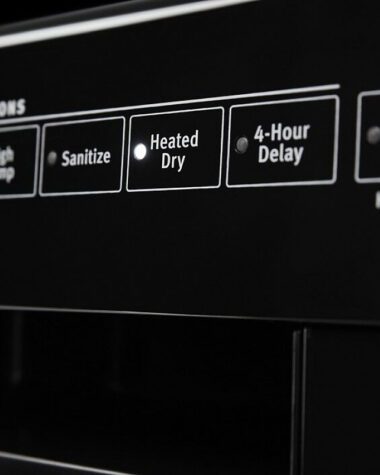Whenever you think of dishwashers, chances are KitchenAid and Bosch dishwashers will pop into your head. After all, they are the two brands that have remained on top of the market for particular kitchen appliance offerings.
These two manufacturers of top-notch dishwashers have successfully remained at the higher echelon of appliance reviewers’ lists time and time again for a good reason. They are just that good at what they do.
In this article, we will look at the small and significant differences you should consider before going for either of these top brands.
We want to distinguish the two titans of the dishwasher market in the hopes of helping you choose which would fit you the best.
Summary Tables: KitchenAid vs Bosch Dishwashers
Even before Bosch made a name for itself as a manufacturer of top-of-the-line kitchen appliances, KitchenAid was already atop the dishwasher market.
That being said, at a time when dishwashers became infamous for how noisy they can get when operating, Bosch stepped into the limelight and introduced the very first ultra-quiet dishwasher.
Soon enough, Bosch began edging out its senior, KitchenAid, in various categories. This includes drying prowess, cleaning features, and overall reliability.
While Bosch became the new popular brand everyone was going crazy for, KitchenAid fired back by dialing up its offerings as well. It significantly improved its loading options, tuned up filtration settings, and began incorporating several efficient product features.
Today, the two brands compete head-to-head to see who is the undisputed king of the dishwasher market.
KitchenAid PrintShield Dishwasher vs. Bosch 800 Series Dishwasher
To give you a clearer picture of the key differences and similarities between KitchenAid and Bosch, we constructed a simple table below comparing two highly-rated dishwashers we have taken from each brand. Have a look:
| Product Features | KitchenAid PrintShield Dishwasher | Bosch 800 Series Dishwasher |
|---|---|---|
| Dishwasher Type | Front Control | Front Control |
| Number of Wash Cycles | 5 Cycles | 6 Cycles |
| Number of Racks | 2 Rack Options | 3 Rack Options |
| Number of Place Settings | 14 Place Settings | 16 Place Settings |
| Fingerprint-Resistant | Yes | No |
| Sensor Wash | Yes | No |
| Sanitize Options | Yes | Yes |
| Color/Finish | Black, White, Stainless Steel, Black Stainless Steel | Black, White, Stainless Steel |
| Handle Type | Pocket Handle | Recessed |
| Smart Features | No | No |
| Noise Level | 46 Decibels | 42 Decibels |
| Energy Star Certification | Yes | Yes |
| Price | $949 | $1,149 |
Comparison Table
In the next round, we will highlight certain categories and determine which of the two brands has the edge over the other. This includes their dishwashers’ features, ease of use, and many more.
| Category | KitchenAid | Bosch |
|---|---|---|
| Features | No | Yes |
| Ease of Use | Yes | No |
| Power Efficiency | No | Yes |
| Noise Level | Yes | No |
| Drying Prowess | Yes | No |
| Warranty | No | Yes |
| Customer Reviews | No | Yes |
KitchenAid machines are typically more straightforward in design and are easy to operate, making them more user-friendly than Bosch’s.
It also takes the cake in the noise level and drying prowess categories thanks to its recent improvements to address the issues that have once plagued them.
Bosch, meanwhile, is more beloved by customers. This is largely thanks to its more advanced features, flexible power efficiency options, and consumer-friendly warranties.
Lastly, pricing is basically the same for both brands. Their low-tier to higher-end machines do not differ much in terms of pricing.
Pros and Cons
Here is a table indicating the pros and cons when buying KitchenAid and Bosch dishwashers:
| Dishwasher Brand | Pros | Cons |
|---|---|---|
| KitchenAid | Quiet as a mouse Ensures that dishes and kitchen utensils are dry as can be Very user-friendly They can fit more than any other home dishwasher Some machines have exterior options to match your kitchen’s overall aesthetic | No smart features unlike other modern brands Has limited variety Some machines stick out of cabinets because of their size/ harder to slot in Are sometimes challenging to set up |
| Bosch | Germ-free Cleaning Power/Water Conservation Features Safety Features Keeps utensils in tip-top shape Some units have wi-fi capabilities/ perfect for smart homes Well-trusted by customers | There are more quieter alternatives Some machines leave dishes still wet Some of its features may not be that user-friendly |
Now that we have set the stage for the forthcoming showdown by comparing the two brands’ best-selling dishwashers and highlighting their respective strengths and weaknesses, let us now see what these brands offer – starting with KitchenAid.
KitchenAid Dishwashers Overview
KitchenAid is a luxury yet affordable appliance brand brought to us by the Whirlpool Corporation. As we have briefly brushed upon above, their early dishwasher units changed the dishwashing business back then because of their solid commercial design and top-of-the-line functionality.
However, its glaring weakness soon became evident. KitchenAid dishwashers were too noisy – while it cleans dirty dishes efficiently and well, its noise while operating was unbearable for some.
To their credit, KitchenAid finally addressed this issue by introducing noiseless dishwasher units (only reaching 39 decibels) and altering their designs to resemble European appliances by adding a filter and removing the disposer.
KitchenAid now has two different dishwasher series, the TE and TM series.
The TE series dishwashers are the brand’s answer for the noise criticism they have been getting for years. These machines have a noise level not going over 39 decibels.
On the other hand, the TM series dishwashers are their conventional units tuned up for the better. While noisier, they have better racking, washing, and drying systems.
Odd as it may seem, the less expensive the KitchenAid dishwasher is, the quieter it is, whereas, in most brands out there, the most expensive is the quietest.
Here are other advanced features you can expect with a KitchenAid dishwasher:
- ProDry Drying System
- SatinGlide Max Rails
- Advanced Clean Water Wash System
- Specialty Wash Cycles
- Super-fast Express Wash Cycle
- Sensor Wash Technology
Related Article: 7 Best KitchenAid Dishwashers for 2023
Bosch Dishwashers Overview
Even though Bosch is based in Germany, its dishwasher units are made specifically in North Carolina. Arguably taking what KitchenAid started and turning up a notch higher, Bosch skyrocketed to the top of the dishwashing market thanks to its units’ capability to function perfectly well while also remaining ultra-quiet.
While Bosch dishwashers excel in various components, their weakness has always been drying. Most European-style stainless dishwashers, such as Bosch’s, use condensation from the heat of the wash and JetDry feature to dry dishes.
Bosch addressed this drying issue by introducing the AutoAir feature on newer models. This feature pops open the dishwasher automatically after the cycle is complete. Doing this will release the built-up moisture in the interior of the machine, which in turn speeds up the drying process.
Bosch brand categorizes dishwashers by series, particularly the 300, 500, and 800 series. These dishwasher series are very popular for their competitive prices despite their truly stellar cleaning performance.
Some of the most sought-after features of Bosch Dishwashers include their durable and robust designs, exemplary performance, and unparalleled customer service.
On top of that, you can also purchase Bosch dishwashers in five different fronts: Regular, Integrated, Pocket Handle, Towel Bar, and Panel-Ready.
Here are other advanced features you can expect with a Bosch dishwasher:
- EcoSilence Motor System
- CrystalDry Drying System
- EasyGlide Adjustable Third Rack
- LED Remaining Time Display
- AquaStop Leak Protection
- Ultra-quiet Cycles as low as 42 Decibels
Related Article: Best Bosch Dishwasher for 2023: 300 vs 500 vs 800 Series
What are their main differences?
There are two main differences between KitchenAid and Bosch dishwashers: how the water is heated during their cycles and how the racks are set up.
How water is heated differs significantly from one brand to the other. While KitchenAid uses an exposed heating element in the bottom of its machines to heat the water, Bosch utilizes a flow-through heater which heats water as it enters the dishwasher instead.
Since the flow-through heater allows Bosch to reach a much higher temperature more efficiently and hold such temperatures for longer compared to KitchenAid, it can clean and sanitize better.
Meanwhile, the exposed heating element found in KitchenAid dishwashers ensures that the dishes you feed it come out dry as a bone. This is because the element essentially bakes the dishwasher’s interior to dry the dishes within.
However, due to the intense heating of the exposed element, it wouldn’t be advisable to feed KitchenAid dishwasher plastics as they would more than likely warp or melt if kept unchecked.
Next is how their respective racks are set up. Because KitchenAid is mostly designed for US consumers, the racks are set up to appeal to an American household or lifestyle.
Bosch, on the other hand, fits a more European aesthetic. KitchenAid is probably the best option for you if you have large, bulky kitchen items.
And on the contrary, if you have smaller dishware, Bosch may be a better fit in your kitchen.
Conclusion
KitchenAid and Bosch dishwashers provide tremendous value for money and offer a wide range of features. With that being said, among all the design similarities, Bosch dishwashers barely managed to show out KitchenAid.
While KitchenAid dishwashers are arguably more cost-effective, Bosch machines are a tad more advanced. Customer reviews are overwhelmingly positive for Bosch, and that is saying something.
Nevertheless, what’s best for you still depends on what it is precisely that you need and are capable of.
Related Article: Dishwasher 101: The Definitive Guide for Beginners
Identify the budget you are willing to allocate for the dishwasher you are looking for, determine what you need the most out of it, and then go back to this article and see which of the two brands we highlighted fit you the most.
You may also want to look at our top picks for the best dishwasher this 2023.









